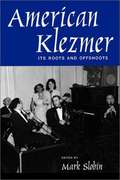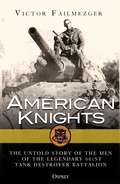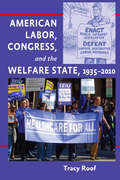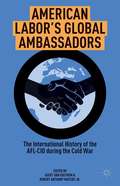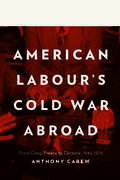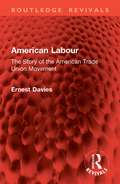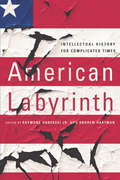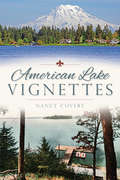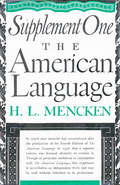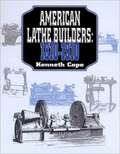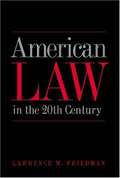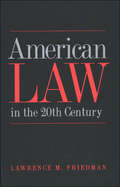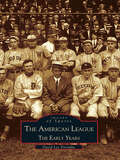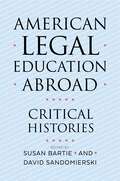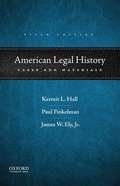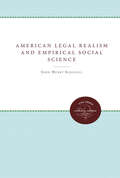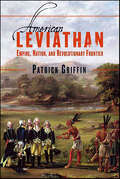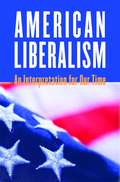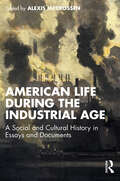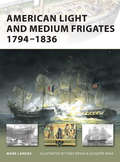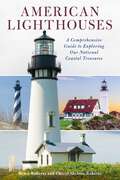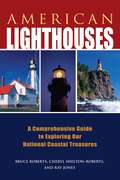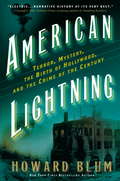- Table View
- List View
American Klezmer: Its Roots and Offshoots
by Mark SlobinKlezmer,the Yiddish word for a folk instrumental musician, today flourishes in the United States and abroad in the world music and accompany Jewish celebrations. The essays collected in this volume investigate American klezmer: its roots, its evolution, and its spirited revitalization. The contributors offer a wide range of perspectives on the musical, social, and cultural history of klezmer in American life.
American Knights
by Victor FailmezgerAn unmissable white-knuckle ride from the Kasserine pass to Anzio, Operation Dragoon to the final attacks on the Third Reich, this is the gripping story of the men and machines that took on Nazi Germany's best. This book not only reveals the technical details and origins of the 601st Tank Destroyer Battalion, it places the reader on the front lines of the European war. As the war swung in the favor of the Allies, it became clear that no final defeat of the Third Reich would be possible until the armored monsters of the Panzerwaffe were defeated. But who would, or even could, take on the mighty Tigers and Panthers, just a handful of whom could stop entire formations in their tracks? The answer lay with the formation of a new type of unit, the Tank Destroyer Batallion. This is the story of the men and machines who made up the very first Tank Destroyer Batallion, the 601st, from their unique training and formation, to the final, desperate battles in the heart of Nazi Germany. Packed with rare material, letters, diaries and unpupublished photographs, this is an intense and intimate chronicle of the men who fought the Panzers in an astonishing 10 campaigns and 546 days of lethal combat. Re-live the excitement and terror of battling the best the Wehrmacht and SS had to offer, in every major campaign in the West.
American Labor, Congress, and the Welfare State, 1935–2010
by Tracy RoofDespite achieving monumental reforms in the United States such as the eight-hour workday, a federal minimum wage, and workplace health and safety laws, organized labor’s record on much of its agenda has been mixed. Tracy Roof’s sweeping examination of labor unions and the American legislative process explains how this came to be and what it means for American workers.Tracing a 75-year arc in labor movement history, Roof discusses the complex interplay between unions and Congress, showing the effects of each on the other, how the relationship has evolved, and the resulting political outcomes. She analyzes labor’s success at passing legislation and pushing political reform in the face of legislative institutional barriers such as the Senate filibuster and an entrenched and powerful committee structure, looks at the roots and impact of the interdependent relationship between the Democratic Party and the labor movement, and assesses labor’s prospects for future progress in creating a comprehensive welfare state. Roof’s original investigation details the history, actions, and consequences of major policy battles over areas such as labor law reform and health care policy. In the process, she brings to light practical and existential questions for labor leaders, scholars, and policy makers.Although American labor remains a force within the political process, decades of steadily declining membership and hostile political forces pose real threats to the movement. Roof’s shrewd exploration of unions, Congress, and the political process challenges conventional explanations for organized labor’s political failings.
American Labor, Congress, and the Welfare State, 1935–2010
by Tracy RoofA study of the relationship between the U.S. Congress and the American labor movement over the course of a 75-year period.Despite achieving monumental reforms in the United States such as the eight-hour workday, a federal minimum wage, and workplace health and safety laws, organized labor’s record on much of its agenda has been mixed. Tracy Roof’s sweeping examination of labor unions and the American legislative process explains how this came to be and what it means for American workers.Tracing a 75-year arc in labor movement history, Roof discusses the complex interplay between unions and Congress, showing the effects of each on the other, how the relationship has evolved, and the resulting political outcomes. She analyzes labor’s success at passing legislation and pushing political reform in the face of legislative institutional barriers such as the Senate filibuster and an entrenched and powerful committee structure, looks at the roots and impact of the interdependent relationship between the Democratic Party and the labor movement, and assesses labor's prospects for future progress in creating a comprehensive welfare state. Roof’s original investigation details the history, actions, and consequences of major policy battles over areas such as labor law reform and health care policy. In the process, she brings to light practical and existential questions for labor leaders, scholars, and policy makers.Although American labor remains a force within the political process, decades of steadily declining membership and hostile political forces pose real threats to the movement. Roof’s shrewd exploration of unions, Congress, and the political process challenges conventional explanations for organized labor’s political failings.
American Labor’s Global Ambassadors
by Jr. Robert Anthony Waters Geert Van Goethem Marcel Van Der L IndenFollowing World War II, the AFL-CIO pursued an ambitious international agenda. To its leaders, the imperatives of saving Western Europe from Stalinism, rolling back Soviet gains in Eastern Europe, containing Communism around the world, throwing off the shackles of colonialism, and overcoming "uneven development" justified extraordinary measures. They sought to protect international labor while fostering American-style "business unionism," which used collective bargaining and strikes to capture a greater share of the capitalist system's economic pie. At the same time, they believed that thwarting Communist designs on local organizations was a prerequisite to cultivating free labor movements and creating prosperity for the world's workers - and battling Communism often meant working in conjunction with the US government, including even the Central Intelligence Agency. This sweeping state-of-the-field collection brings together contributions from leading diplomatic, labor, and transnational historians to explore and assess the AFL-CIO's successes, challenges, and inevitable compromises as it pursued these varied initiatives during the Cold War era.
American Labour's Cold War Abroad: From Deep Freeze to Détente, 1945-1970
by Anthony CarewDuring the Cold War, American labour organizations were at the centre of the battle for the hearts and minds of working people. At a time when trade unions were a substantial force in both American and European politics, the fiercely anti-communist American Federation of Labor–Congress of Industrial Organizations (AFL–CIO), set a strong example for labour organizations overseas. The AFL–CIO cooperated closely with the US government on foreign policy and enjoyed an intimate, if sometimes strained, relationship with the CIA. The activities of its international staff, and especially the often secretive work of Jay Lovestone and Irving Brown—whose biographies read like characters plucked from a Le Carré novel—exerted a major influence on relationships in Europe and beyond.Having mastered the enormous volume of correspondence and other records generated by staffers Lovestone and Brown, Carew presents a lively and clear account of what has largely been an unknown dimension of the Cold War. In impressive detail, Carew maps the international programs of the AFL–CIO during the Cold War and its relations with labour organizations abroad, in addition to providing a summary of the labour situation of a dozen or more countries including Finland, France, Italy, Germany, Japan, Greece, and India. American Labour’s Cold War Abroad reveals how the Cold War compelled trade unionists to reflect on the role of unions in a free society. Yet there was to be no meeting of minds on this, and at the end of the 1960s the AFL–CIO broke with the mainstream of the international labour movement to pursue its own crusade against communism.
American Labour: The Story of the American Trade Union Movement (Routledge Revivals)
by Ernest DaviesFirst Published in 1943, American Labour presents a comprehensive story of the American trade union movement. The book discusses important themes like United States versus the workers; progress of unionization; labour and the new deal; industrial unions; behaviour of John L Lewis; labour and defence; the absence of a Labour Party in America and American labour after the war. With a preface from Harold J. Laski, this book is a must-read historical document for students of labour history, labour movement, and American history.
American Labyrinth: Intellectual History for Complicated Times
by Andrew Hartman Raymond HaberskiIntellectual history has never been more relevant and more important to public life in the United States. In complicated and confounding times, people look for the principles that drive action and the foundations that support national ideals. American Labyrinth demonstrates the power of intellectual history to illuminate our public life and examine our ideological assumptions.This volume of essays brings together 19 influential intellectual historians to contribute original thoughts on topics of widespread interest. Raymond Haberski Jr. and Andrew Hartman asked a group of nimble, sharp scholars to respond to a simple question: How might the resources of intellectual history help shed light on contemporary issues with historical resonance? The answers—all rigorous, original, and challenging—are as eclectic in approach and temperament as the authors are different in their interests and methods. Taken together, the essays of American Labyrinth illustrate how intellectual historians, operating in many different registers at once and ranging from the theoretical to the political, can provide telling insights for understanding a public sphere fraught with conflict.In order to understand why people are ready to fight over cultural symbols and political positions we must have insight into how ideas organize, enliven, and define our lives. Ultimately, as Haberski and Hartman show in this volume, the best route through our contemporary American labyrinth is the path that traces our practical and lived ideas.
American Lake Vignettes (American Chronicles)
by Nancy CovertLake City and Tillicum began as two communities separated by American Lake. Although they later joined with other surrounding neighborhoods to become part of the City of Lakewood, American Lake remains the treasured focal point of the region. The largest of twelve lakes in the Lakes District, American Lake was once envisioned by Tacoma developers as an ideal resort location. But their grandiose dreams came to a crashing halt with the Panic of 1893. Author Nancy Covert explores the little-known history of American Lake, weaving together stories from lifelong residents. Their tales recall a simpler time, when money earned from paper routes paid for seaplane flight lessons and dancing at the Lakeside Country Club was a favorite pastime. Join Covert for a vivid look back at life on American Lake.
American Language Supplement 1
by H.L. MenckenPerhaps the first truly important book about the divergence of American English from its British roots, this survey of the language as it was spoken-and as it was changing-at the beginning of the 20th century comes via one of its most inveterate watchers, journalist, critic, and editor HENRY LOUIS MENCKEN (1880-1956).In this replica of the 1921 "revised and enlarged" second edition, Mencken turns his keen ear on:• the general character of American English• loan-words and non-English influences• expletives and forbidden words• American slang• the future of the language• and much, much more.Anyone fascinated by words will find this a thoroughly enthralling look at the most changeable language on the face of the planet.
American Lathe Builders, 1810-1910
by Kenneth L. CopeOnce again, Ken Cope has produced a major new reference work that broadens our range of understanding of the history of technological innovation. This is the first book to identify American lathe builders operating throughout the 19th and early 20th centuries. Written in the style of the author?s previous groundbreaking books on the machine tool industry, this encyclopedic volume provides the collector, user, and researcher with invaluable information on over 330 lathe builders, many of whom have previously gone unrecognized by researchers. More than a thousand illustrations, taken from original catalogs and periodicals, trace the development of the American metal cutting lathe from the crude, handbuilt models of the early 19th century to the fast, powerful models introduced in the early 20th century for use with high speed steel cutting tools. Dozens of early lathe accessories, such as gear-cutting attachments, are also identified and illustrated for the first time. In addition, the book contains a glossary of terms used in describing the various lathes
American Law in the 20th Century
by Lawrence Meir FriedmanIn this long-awaited successor to his landmark work "A History of American Law, " Friedman offers a monumental history of American law throughout the great upheavals of the 20th century: two world wars, the Great Depression, the civil rights movement, and the sexual revolution.
American Law in the Twentieth Century
by Lawrence M. FriedmanIn this long-awaited successor to his landmark work A History of American Law, Lawrence M. Friedman offers a monumental history of American law in the twentieth century.The first general history of its kind, American Law in the Twentieth Century describes the explosion of law over the past century into almost every aspect of American life. Since 1900 the center of legal gravity in the United States has shifted from the state to the federal government, with the creation of agencies and programs ranging from Social Security to the Securities Exchange Commission to the Food and Drug Administration. Major demographic changes have spurred legal developments in such areas as family law and immigration law. Dramatic advances in technology have placed new demands on the legal system in fields ranging from automobile regulation to intellectual property.Throughout the book, Friedman focuses on the social context of American law. He explores the extent to which transformations in the legal order have resulted from the social upheavals of the twentieth century--including two world wars, the Great Depression, the civil rights movement, and the sexual revolution. Friedman also discusses the international context of American law: what has the American legal system drawn from other countries? And in an age of global dominance, what impact has the American legal system had abroad?Written by one of our most eminent legal historians, this engrossing book chronicles a century of revolutionary change within a legal system that has come to affect us all.
American League: The Early Years (Images of Sports)
by David Lee PorembaShowcasing two influential decades of home runs, stolen bases, and national heroes, David Lee Poremba invites us to take an in-depth look back through the history of baseball in The American League: The Early Years. Poremba has collected over 200 images and captions in this new volume that documents the fledgling American League and its charismatic teams, from its creation in 1901 to its lively rebirth as America's Pastime in 1920. Founded nearly a century ago when Western League President Ban Johnson renamed the circuit in 1900, the American League defied the norm. Amidst the struggles to name a National League president and the expiration of the National Agreement which governed the baseball world, Johnson leapt into open competition for players and fans. Seen in this extensive photographic collection are the historic players lured away from the National League and into the higher paying American League, including Ty Cobb, "Shoeless" Joe Jackson, "Wee" Willie Keeler, Cy Young, Nap Lajoie, and many others. With the introduction of the cork-centered baseball in 1910 and the advent of the Sultan of Swat, Babe Ruth, the game of baseball would change forever.
American Legal Education Abroad: Critical Histories
by Susan Bartie David SandomierskiA critical history of the Americanization of legal education in fourteen countriesThe second half of the twentieth century witnessed the export of American power—both hard and soft—throughout the world. What role did US cultural and economic imperialism play in legal education? American Legal Education Abroad offers an unprecedented and surprising picture of the history of legal education in fourteen countries beyond the United States.Each study in this book represents a critical history of the Americanization of legal education, reexamining prevailing narratives of exportation, transplantation, and imperialism. Collectively, these studies challenge the conventional wisdom that American ideas and practices have dominated globally. Editors Susan Bartie and David Sandomierski and their contributors suggest that to understand legal education and to respond thoughtfully to the mounting present-day challenges, it is essential to look beyond a particular region and consider not only the ideas behind legal education but also the broader historical, political, and cultural factors that have shaped them.American Legal Education Abroad begins with an important foundational history by leading Harvard Law School historian Bruce Kimball, who explains the factors that created a transportable American legal model, and the book concludes with reflections from two prominent American law professors, Susan Carle and Bob Gordon, whose observations on recent disruptions within US law schools suggest that their influence within the global order of legal education may soon fall into further decline. This book should be considered an invaluable resource for anyone in the field of law.
American Legal History: Cases and Materials (Fifth Edition)
by Paul Finkelman James W. Ely Kermit L. HallThis highly acclaimed text provides a comprehensive selection of the most important documents in American legal history, integrating the history of public and private law from America's colonial origins to the present. Devoting special attention to the interaction of social and legal change, American Legal History: Cases and Materials, Fifth Edition, shows how legal ideas developed in tandem with specific historical events and reveals a rich legal culture unique to America. The book also deals with state and federal courts and looks at the relationship between the development of American society, politics, and economy and how it relates to the evolution of American law. Introductions and instructive headnotes accompany each document, tying legal developments to broader historical themes and providing a social and political context essential to an understanding of the history of law in America. Setting the legal challenges of the twenty-first century in a broad context, American Legal History, Fifth Edition, is an indispensable text for students and teachers of constitutional and legal history, the judicial process, and the effects of society on law.
American Legal Realism and Empirical Social Science (Studies in Legal History)
by John Henry SchlegelJohn Henry Schlegel recovers a largely ignored aspect of American Legal Realism, a movement in legal thought in the 1920s and 1930s that sought to bring the modern notion of empirical science into the study and teaching of law. In this book, he explores individual Realist scholars' efforts to challenge the received notion that the study of law was primarily a matter of learning rules and how to manipulate them. He argues that empirical research was integral to Legal Realism, and he explores why this kind of research did not, finally, become a part of American law school curricula. Schlegel reviews the work of several prominent Realists but concentrates on the writings of Walter Wheeler Cook, Underhill Moore, and Charles E. Clark. He reveals how their interest in empirical research was a product of their personal and professional circumstances and demonstrates the influence of John Dewey's ideas on the expression of that interest. According to Schlegel, competing understandings of the role of empirical inquiry contributed to the slow decline of this kind of research by professors of law.Originally published in 1995.A UNC Press Enduring Edition -- UNC Press Enduring Editions use the latest in digital technology to make available again books from our distinguished backlist that were previously out of print. These editions are published unaltered from the original, and are presented in affordable paperback formats, bringing readers both historical and cultural value.
American Leviathan: Empire, Nation, and Revolutionary Frontier
by Patrick GriffinThe war that raged along America's frontier during the period of the American Revolution was longer, bloodier, and arguably more revolutionary than what transpired on the Atlantic coast.Between 1763 and 1795 westerners not only participated in a War of Independence but engaged in a revolution that ushered in fundamental changes in social relations, political allegiances, and assumptions about the relationship between individuals and society. On the frontier, the process of forging sovereignty and citizens was stripped down to its essence. Settlers struggled with the very stuff of revolution: violence, uncertainty, disorder, and the frenzied competition to remake the fabric of society. In so doing, they were transformed from deferential subjects to self-sovereign citizens as the British Empire gave way to the American nation. But something more fundamental was at work. The violent nature of the contest to reconstitute sovereignty produced a revolutionary settlement in which race and citizenship went hand in hand. The common people demanded as much, and the state delivered. As westerners contended in a Hobbesian world, they also created some of the myths that made America American.Patrick Griffin recaptures a chaotic world of settlers, Indians, speculators, British regulars, and American and state officials, vying with one another to remake the West during its most formative period.
American Liberalism
by John McgowanAmericans live in a liberal democracy. Yet, although democracy is widely touted today, liberalism is scorned by both the right and the left. The United States stands poised between its liberal democratic tradition and the illiberal alternatives of liberalism's critics. John McGowan argues that Americans should think twice before jettisoning the liberalism that guided American politics from James Madison to the New Deal and the Great Society. In an engaging and informative discussion, McGowan offers a ringing endorsement of American liberalism's basic principles, values, and commitments. He identifies five tenets of liberalism: a commitment to liberty and equality, trust in a constitutionally established rule of law, a conviction that modern societies are irreducibly plural, the promotion of a diverse civil society, and a reliance on public debate and deliberation to influence others' opinions and actions.McGowan explains how America's founders rejected the simplistic notion that government or society is necessarily oppressive. They were, however, acutely aware of the danger of tyranny. The liberalism of the founders distributed power widely in order to limit the power any one entity could exercise over others. Their aim was to provide for all an effective freedom that combined the right to self-determination with the ability to achieve one's self-chosen goals. In tracing this history, McGowan offers a clear vision of liberalism's foundational values as America's best guarantee today of liberty and the peace in which to exercise it.What are the basic values and commitments of American liberals? John McGowan sets out to answer that question in this lively and provocative book. Tracing a tradition that extends from James Madison through Franklin Delano Roosevelt to today, McGowan emphasizes liberalism's distribution of power throughout society in order to secure freedom and equality. Liberals locate the effort to achieve legal, political, and social equality as central to securing a just and stable society. They also insist that only an "effective" freedom that includes the capacity to achieve one's self-chosen goals deserves the name of liberty. By presenting the history of the much-contested values of freedom, equality, and social justice, McGowan offers a clear vision of liberalism's ambitious and inspiring vision for these United States.-->
American Life During the Industrial Age: A Social and Cultural History in Essays and Documents
by Alexis McCrossenThis volume explores the Industrial Age (1860–1914), bringing together published and archival primary sources with introductory essays that contextualize a period of extraordinary social, cultural, and economic transformation.The Industrial Age’s developments, which included electricity, internal-combustion engines, moving assembly lines, and clock time, posed as much risk and opportunity as do today’s innovations. Today artificial intelligence, terrorism, climate change, and the threat of pandemics like Covid-19 threaten our safety and sense of well-being, just as machine production, the labor movement, toxic chemicals and waste, and epidemics like tuberculosis and cholera posed significant challenges in the Industrial Age. This modern and innovative collection features tried and tested topics, such as immigration and labor, along with underexplored ones, such as electricity, abundance, and contaminants. Each chapter includes a historiographical essay exploring the rich historical and sociological scholarship on the period in the United States, while framing the documents and illustrations included in the chapter. American Life During the Industrial Age is an ideal companion to undergraduate and graduate courses in United States history, American studies, the history of technology, and the history of culture and society.
American Light and Medium Frigates 1794-1836
by Tony Bryan Mark LardasThe "Original Six" frigates were commissioned by the new-born US Navy at a staggering cost of $688,888.82. Designed to be light and fast, these warships enabled America to project its power across the globe. Among the ships Mark Lardas examines is USS Constellation: the first ship to be commissioned by the United States Navy, and also the first ship to engage and capture an enemy vessel, the French L'Insurgente - this engagement is vividly portrayed in original color artwork. The fascinating history of the USS Chesapeake is also brought to life through the dramatic account one of the bloodiest duels in the age of fighting sail as the Chesapeake meets the British frigate Shannon and is overwhelmed, the dying cry of the captain, "Don't give up the ship!" inspired the US Navy thereafter. Alongside stirring accounts of engagements during the Barbary Wars and the Quasi-War, the author explores the design and development of these frigates, explaining the shortcomings that led to their replacement by larger, heavier 44-gun models by 1800. Contemporary illustrations of US frigates and their British and French rivals help to place these ships in the context of European ship design, clearly showing the escalation of the naval 'arms race' during the seventeenth century. American Light and Medium Frigates is an ideal resource for any naval enthusiast wanting to learn more about the ships that witnessed the rise of the US Navy and Marines.
American Lighthouses: A Comprehensive Guide To Exploring Our National Coastal Treasures
by Bruce Roberts Cheryl Shelton-RobertsFor more than two centuries, lighthouses have helped sailors find their way through treacherous waters, guiding them home or taking them safely through passages on their way to adventure. These historic towers and houses form a sparkling chain of lights along our coasts, a reminder of the past echoing with adventure and mystery, a lure for travelers looking for a glimpse into a romantic past.American Lighthouses offers more than just a tour of over 450 beautiful and historic navigational beacons dotting the coasts and lakes of the United States. This fully illustrated, one-of-a-kind handbook details their history and architecture and provides full information on visiting or viewing them.
American Lighthouses: A Comprehensive Guide to Exploring Our National Coastal Treasures (Lighthouse Series)
by Ray Jones Bruce Roberts Cheryl Shelton-RobertsA celebration of the great American lighthouses, their keepers, their histories, and their ongoing storiesFor more than two centuries, lighthouses have helped sailors find their way through treacherous waters, guiding them home or taking them safely through passages on their way to adventure. These historic towers and houses form a sparkling chain of lights along our coasts, a reminder of the past echoing with adventure and mystery, a lure for travelers looking for a glimpse into a romantic past. Completely revised and updated, American Lighthouses offers more than just a tour of 450 beautiful and historic navigational beacons dotting the coasts and lakes of the United States. This fully illustrated, one-of-a-kind handbook details their history and architecture and provides full information on visiting or viewing them. Included are many endangered lights, threatened by erosion or lack of funding, as well as &“ghost lights,&” which are no longer standing.
American Lightning
by Howard BlumIt was an explosion that reverberated across the country--and into the very heart of early-twentieth-century America. On the morning of October 1, 1910, the walls of the Los Angeles Times Building buckled as a thunderous detonation sent men, machinery, and mortar rocketing into the night air. When at last the wreckage had been sifted and the hospital triage units consulted, twenty-one people were declared dead and dozens more injured. But as it turned out, this was just a prelude to the devastation that was to come.In American Lightning, acclaimed author Howard Blum masterfully evokes the incredible circumstances that led to the original "crime of the century"--and an aftermath more dramatic than even the crime itself. With smoke still wafting up from the charred ruins, the city's mayor reacts with undisguised excitement when he learns of the arrival, only that morning, of America's greatest detective, William J. Burns, a former Secret Service man who has been likened to Sherlock Holmes. Surely Burns, already world famous for cracking unsolvable crimes and for his elaborate disguises, can run the perpetrators to ground. Through the work of many months, snowbound stakeouts, and brilliant forensic sleuthing, the great investigator finally identifies the men he believes are responsible for so much destruction. Stunningly, Burns accuses the men--labor activists with an apparent grudge against the Los Angeles Times's fiercely anti-union owner--of not just one heinous deed but of being part of a terror wave involving hundreds of bombings. While preparation is laid for America's highest profile trial ever--and the forces of labor and capital wage hand-to-hand combat in the streets--two other notable figures are swept into the drama: industry-shaping filmmaker D.W. Griffith, who perceives in these events the possibility of great art and who will go on to alchemize his observations into the landmark film The Birth of a Nation; and crusading lawyer Clarence Darrow, committed to lend his eloquence to the defendants, though he will be driven to thoughts of suicide before events have fully played out.Simultaneously offering the absorbing reading experience of a can't-put-it-down thriller and the perception-altering resonance of a story whose reverberations continue even today, American Lightning is a masterpiece of narrative nonfiction.From the Hardcover edition.
American Lightning
by Howard BlumIt was an explosion that reverberated across the country--and into the very heart of early-twentieth-century America. On the morning of October 1, 1910, the walls of the Los Angeles Times Building buckled as a thunderous detonation sent men, machinery, and mortar rocketing into the night air. When at last the wreckage had been sifted and the hospital triage units consulted, twenty-one people were declared dead and dozens more injured. But as it turned out, this was just a prelude to the devastation that was to come.In American Lightning, acclaimed author Howard Blum masterfully evokes the incredible circumstances that led to the original "crime of the century"--and an aftermath more dramatic than even the crime itself. With smoke still wafting up from the charred ruins, the city's mayor reacts with undisguised excitement when he learns of the arrival, only that morning, of America's greatest detective, William J. Burns, a former Secret Service man who has been likened to Sherlock Holmes. Surely Burns, already world famous for cracking unsolvable crimes and for his elaborate disguises, can run the perpetrators to ground. Through the work of many months, snowbound stakeouts, and brilliant forensic sleuthing, the great investigator finally identifies the men he believes are responsible for so much destruction. Stunningly, Burns accuses the men--labor activists with an apparent grudge against the Los Angeles Times's fiercely anti-union owner--of not just one heinous deed but of being part of a terror wave involving hundreds of bombings. While preparation is laid for America's highest profile trial ever--and the forces of labor and capital wage hand-to-hand combat in the streets--two other notable figures are swept into the drama: industry-shaping filmmaker D.W. Griffith, who perceives in these events the possibility of great art and who will go on to alchemize his observations into the landmark film The Birth of a Nation; and crusading lawyer Clarence Darrow, committed to lend his eloquence to the defendants, though he will be driven to thoughts of suicide before events have fully played out.Simultaneously offering the absorbing reading experience of a can't-put-it-down thriller and the perception-altering resonance of a story whose reverberations continue even today, American Lightning is a masterpiece of narrative nonfiction.From the Hardcover edition.
